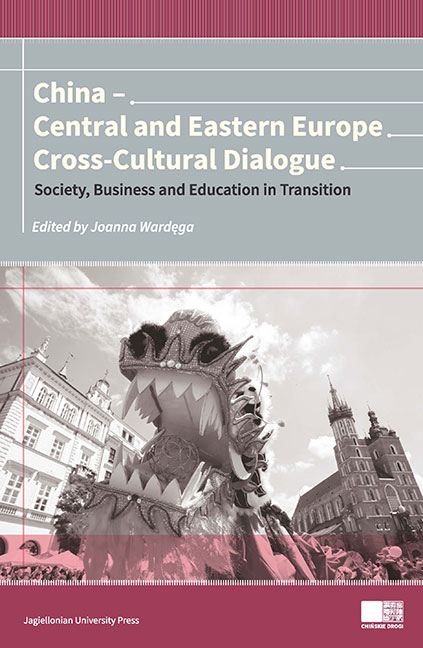Book contents
- Frontmatter
- Contents
- Foreword
- PART I Society and Culture in Transition
- Idealism and Relativism in Ethics: Comparing China and Central Eastern Europe (CEE)
- China's Role in the New World Order
- Redefining and Elderly Caregiving in the 21st Century China and Poland
- Roadmap for Moving to a Low Carbon Economy in China and Poland. Comparative Analysis
- Chinese Community in Poland – the Dynamics of its Development
- Perceptions of China among Central and Eastern European University Students
- Transformation of the Dragon – China's Image in the Polish Media
- Bridges and Obstacles in “the Way of the Ideal Government”: the Transition from Mind Confucianism to Political Confucianism from Jiang Qing's Point of View
- Conceptualizations of Constitutionalism in Recent China's Debates: Preliminary Typologies
- PART TWO Economy and Markets in Transition
- PART THREE Education in Transition
- Contributors
Redefining and Elderly Caregiving in the 21st Century China and Poland
from PART I - Society and Culture in Transition
Published online by Cambridge University Press: 22 December 2017
- Frontmatter
- Contents
- Foreword
- PART I Society and Culture in Transition
- Idealism and Relativism in Ethics: Comparing China and Central Eastern Europe (CEE)
- China's Role in the New World Order
- Redefining and Elderly Caregiving in the 21st Century China and Poland
- Roadmap for Moving to a Low Carbon Economy in China and Poland. Comparative Analysis
- Chinese Community in Poland – the Dynamics of its Development
- Perceptions of China among Central and Eastern European University Students
- Transformation of the Dragon – China's Image in the Polish Media
- Bridges and Obstacles in “the Way of the Ideal Government”: the Transition from Mind Confucianism to Political Confucianism from Jiang Qing's Point of View
- Conceptualizations of Constitutionalism in Recent China's Debates: Preliminary Typologies
- PART TWO Economy and Markets in Transition
- PART THREE Education in Transition
- Contributors
Summary
The family has been the central unit of the Chinese social organization for thousands of years. Traditionally, elders were looked after by the young with minimal state interventions. The Confucian filial piety that bound children to obey and serve their parents was treated as the highest of all virtues. (Cheng & Chan, 2006, p. 262). However, it is a fact that recently the Confucian idea of filial piety has received lots of criticism, particularly from anthropologists and sociologists who focus on the area of “family studies” (Slote & de Vos, 1998). Apart from a few exceptions, commentators have been critical of the idea to such an extent that one might wonder if it still has any relevance for the twenty-first century Chinese society. Nevertheless, as in the case of most concepts and ideas in ancient Chinese philosophy, this is all a matter of interpretation.
Polish families used to be traditionally large, with elders representing an important link with the past. The practice of respecting elders has its roots in the Christian culture. As observed by Robert Bellah (1970), “it is on the basis of authority derived from God that parents and rulers should be reverenced”. It is not due to religious observance, however, that the value of deference to elders is significant to the majority of Poles. Older people are perceived in the Polish culture as the embodiment of wisdom and virtues, and as such, they are to be followed (Kukołowicz, 2002).
Nowadays, in the face of significant changes both of the mentioned countries have been undergoing since the 80's of 20th century – through reforms, marketization and social phenomena like migration and the ageing processes – a question arises about the impact of these changes on the pattern and structure of social relationships. A relevant indicator of social change in the Chinese society is located between the sense and content of the obligation that individuals feel to others, especially in the context of the relationship with parents.
- Type
- Chapter
- Information
- China - Central and Eastern Europe Cross-Cultural Dialogue Society, Business and Education in Transition , pp. 47 - 62Publisher: Jagiellonian University PressPrint publication year: 2016



